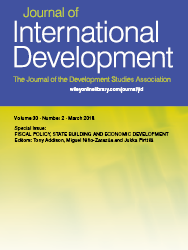Journal Article
When Do Developing Countries Negotiate Away Their Corporate Tax Base?
Developing countries have concluded thousands of bilateral tax treaties, which restrict their ‘taxing rights’ over international investment. Qualitative case studies of these negotiation outcomes emphasize power politics, knowledge asymmetries and negotiating capability in the eventual distribution of taxing rights between signatories, yet such insights are absent from cross-country quantitative work. This paper bridges the gap by replicating two quantitative studies, introducing new data on countries' ability to mobilize tax revenue and the outcomes of tax treaty negotiations. It provides statistical support for the insights from qualitative research.
The size of a government's revenue base, and its reliance on corporate tax, might affect the salience of the revenue sacrifice in policy makers' minds. These variables influence the likelihood of signing a tax treaty and the particular concessions made. Power asymmetries between signatories lead to more unequal distributions of taxing rights away from developing countries, in contrast to the findings of earlier studies. Developing countries also become better negotiators as they gain experience.
 Join the network
Join the network